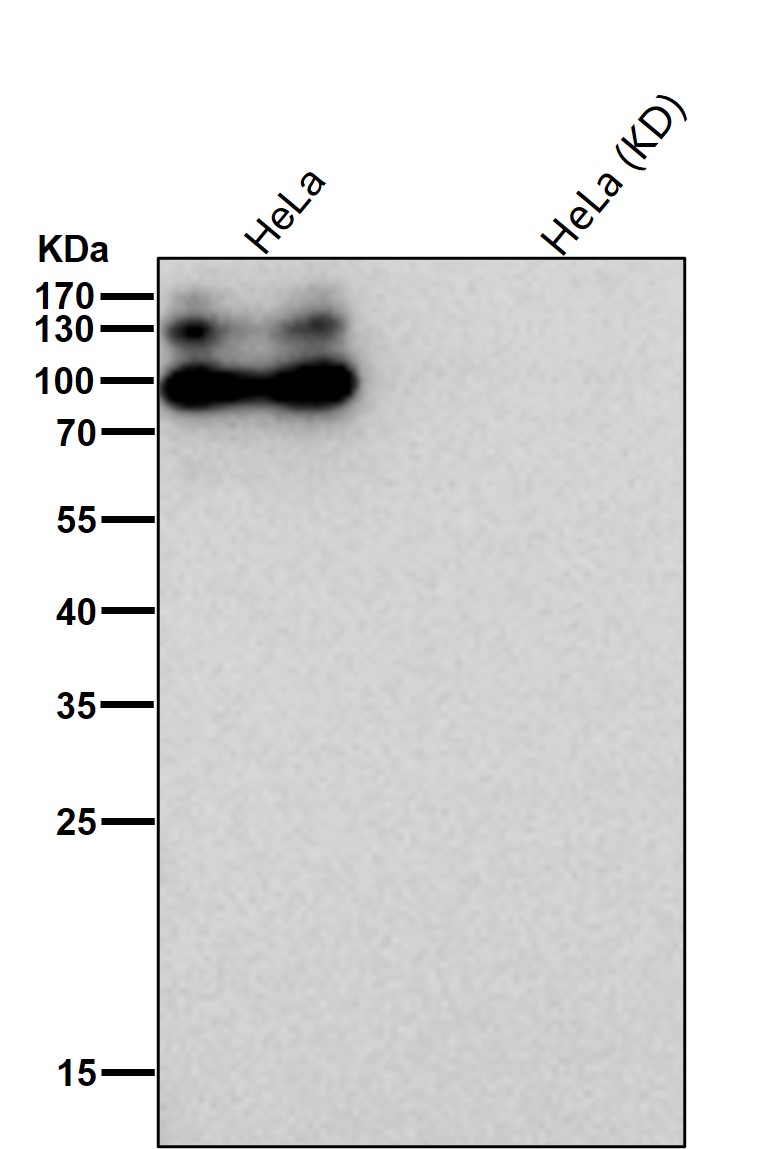

| WB | 咨询技术 | Human,Mouse,Rat |
| IF | 咨询技术 | Human,Mouse,Rat |
| IHC | 1/100-1/200 | Human,Mouse,Rat |
| ICC | 技术咨询 | Human,Mouse,Rat |
| FCM | 咨询技术 | Human,Mouse,Rat |
| Elisa | 咨询技术 | Human,Mouse,Rat |
| Aliases | Aplp2; APPH; APPL2; CDEBP;;APLP2 |
| WB Predicted band size | Calculated MW: 87 kDa ; Observed MW: 87-140 kDa |
| Host/Isotype | Rabbit IgG |
| Antibody Type | Primary antibody |
| Storage | Store at 4°C short term. Aliquot and store at -20°C long term. Avoid freeze/thaw cycles. |
| Species Reactivity | Human,Mouse,Rat |
| Immunogen | A synthesized peptide derived from human APLP2 |
| Formulation | Purified antibody in PBS with 0.05% sodium azide,0.05% BSA and 50% glycerol. |
+ +
以下是关于APLP2抗体的3篇代表性文献及其摘要概括:
---
1. **文献名称**:*Differential Localization of Amyloid Precursor-Like Protein 2 (APLP2) in the Rat Brain*
**作者**:Coulson, E.J., et al.
**摘要**:该研究通过免疫组化和Western blot分析APLP2在大鼠脑组织中的分布,发现其在神经元胞体和突触区域高表达。研究利用特异性抗体揭示了APLP2与APP(淀粉样前体蛋白)的差异定位,提示其可能在突触功能中发挥独特作用。
---
2. **文献名称**:*APLP2 Regulates Synaptic Vesicle Recycling and Interacts with Presynaptic Proteins*
**作者**:Walsh, D.M., et al.
**摘要**:作者通过免疫沉淀和共聚焦显微镜技术,使用APLP2抗体探究其与突触小泡蛋白(如突触素)的相互作用。结果表明,APLP2通过调控突触小泡循环影响神经递质释放,可能参与神经退行性疾病的病理机制。
---
3. **文献名称**:*Targeted Disruption of the APLP2 Gene Does Not Alter Neurodevelopment or Cognitive Function in Mice*
**作者**:von Koch, C.S., et al.
**摘要**:研究利用APLP2敲除小鼠模型,结合免疫印迹和免疫荧光技术验证基因缺失效果。结果显示,尽管APLP2广泛表达于中枢神经系统,但其缺失未导致显著神经发育或行为异常,提示其功能可能与APP存在冗余。
---
这些文献展示了APLP2抗体在蛋白定位、功能机制及基因敲除验证中的关键应用。如需扩展,可进一步检索特定技术(如流式细胞术)或疾病模型相关研究。
The amyloid precursor-like protein 2 (APLP2) is a transmembrane glycoprotein belonging to the conserved amyloid precursor protein (APP) family, which includes APP and APLP1. While APLP2 shares structural and functional similarities with APP—a key player in Alzheimer’s disease (AD) pathogenesis—it lacks the amyloid-beta (Aβ) domain critical for forming neurotoxic plaques. APLP2 is ubiquitously expressed, with high levels in the brain, lungs, and muscles, and is implicated in cell adhesion, synaptic maintenance, and metal ion homeostasis. Studies suggest its role in neuronal outgrowth, calcium signaling, and interactions with synaptic proteins like neurexins.
APLP2-specific antibodies are vital tools for investigating its biological functions and disease associations. Researchers use these antibodies in techniques such as Western blotting, immunohistochemistry, and co-immunoprecipitation to study APLP2 expression, localization, and protein interactions. Unlike APP, APLP2 does not generate Aβ, but its knockout in mice causes synaptic defects and postnatal lethality, highlighting its essential role in development. In AD research, APLP2 antibodies help delineate pathways shared with APP, offering insights into non-amyloid mechanisms of neurodegeneration. Additionally, APLP2 has been linked to cancer progression, with antibodies aiding in exploring its oncogenic potential. Despite overlapping roles with APP/APLP1. APLP2’s unique regulatory features make it a distinct therapeutic and diagnostic target.
×